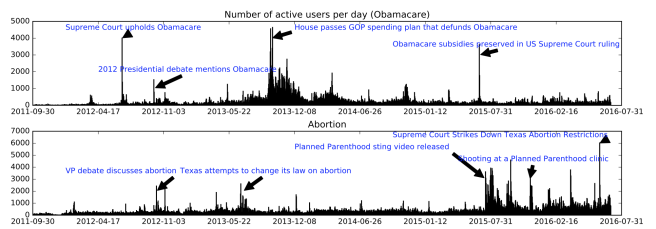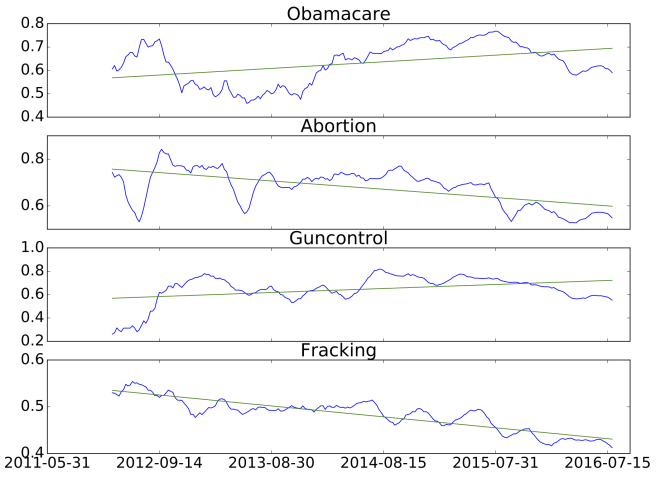The Ebb and Flow of Controversial Debates on Social Media
By Kiran Garimella and Michael Mathioudakis
This article has been originally published on northernbytes.co
Our recent paper titled ‘The Effect of Collective Attention on Controversial Debates on Social Media’ (arXiv link) won the best student paper award at the 9th ACM Web Science conference held in Troy, New York. The paper studies the evolution of long-lived controversial debates on Twitter – i.e., discussions on topics such as ‘gun control’ or ‘abortion’, that reveal a split of opinion between people who support different sides of the argument. The main goal of this work is to study dynamic aspects of controversial debates — in particular: (i) whether controversy around the debates has increased over time; and (ii) whether controversy increases or decreases when major associated events occur.
Data
The dataset consists of an 1% sample of Twitter of all tweets generated between September 2011 and September 2016, as published by Twitter and stored on the Internet Archive (link). For the purposes of the study, we focus on subsets of tweets related to major controversial topics in the USA, including Obamacare, Abortion, and Gun Control.
Measuring Controversy
For each topic in the study, we measure the controversy surrounding the topic for each day spanned by the dataset. To do so, we employ the Random Walk Controversy (RWC) method we developed in earlier work [1]. The RWC score essentially quantifies the degree to which the retweet network of a given topic and day is polarized – and, the higher the RWC score, the higher the controversy around the topic. For more details on the RWC score, we refer the interested reader to the full paper [1].
Controversy over Time
Having obtained a controversy score for each topic and day in the dataset, we can now ask whether controversy has increased over the five years covered in the dataset. The answer to this question is shown in the plot below. The X-axis of the plot spans time at daily granularity, from September 2011 to September 2016; and the Y-axis spans values of the RWC score.

As we see from the figure, even though RWC appears to fluctuate over time, there is no clear trend for increasing or decreasing controversy over time.
Controversy and Collective Attention
Even so, we wish to understand better the fluctuations of controversy over time. Our hypothesis is that the level of controversy around a controversial topic increases or decreases with the collective attention attracted by the topic. In plain terms, we hypothesized that, when a controversial debated was making headlines, the level of controversy around it would increase. For instance,
To test that hypothesis, we follow two steps.
Firstly, we quantified collective attention of a topic a given day as the number of users who post a tweet on that day. As we see in the figure below, this level of attention coincides well with the occurrence of important events related to the topics.

Secondly, we juxtapose RWC score with Collective attention, as measured at daily granularity. The results are shown in the figure below. Larger values on the X-axis of the plots correspond to higher levels of collective attention, and larger values on the Y-axis correspond to higher levels of RWC score.

The figures reveal a clear trend: the higher the level of collective attention on a controversial topic, the larger the controversy as measured by the RWC score.
It is important to note that this trend was not observed for non-controversial topics.
Other Measures and Future Work
In addition to the discussion above, the full paper studies the behavior of other network- and content-based measures over time.
With this work, we dived deeper into the study of controversial debates and the complex interactions they encompass. In future work, we plan to study the interplay between controversy and echo chamber phenomena.
Stay tuned!
[1] Kiran Garimella, Gianmarco De Francisci Morales, Aristides Gionis, and Michael Mathioudakis. 2016. Quantifying Controversy in Social Media. In Proceedings of the Ninth ACM International Conference on Web Search and Data Mining (WSDM ’16). ACM, New York, NY, USA, 33-42. DOI: https://doi.org/10.1145/2835776.2835792

